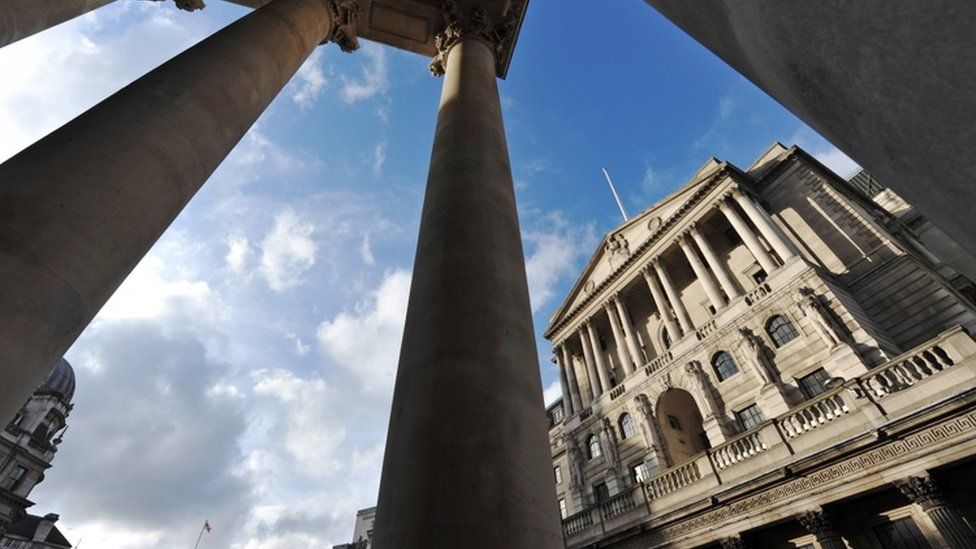Bank of England cuts UK growth outlook as rates held
- Published
- comments

The Bank of England has said it expects economic growth to be flat in the second quarter of the year.
The Bank's Monetary Policy Committee (MPC) had previously predicted growth of 0.2% over the period.
The forecast came as the nine-member committee announced it had voted unanimously to keep UK interest rates on hold, at 0.75%.
The committee said the downgrade in part reflected an easing of stock-building ahead of Brexit deadlines.
In the run-up to the end of March, when the UK had originally been expected to leave the European Union, businesses from pharmaceuticals companies to food manufacturers stockpiled goods.
They wanted to be ready in case the UK left the EU without a transition deal, which they feared could lead to delays at UK borders.
The MPC said since its previous meeting, the "near-term data have been broadly in line with the May Report, but the downside risks to growth have increased".
Global trade tensions had intensified and domestically, the "perceived likelihood of a no-deal Brexit" had risen, it added.
"As expected, recent UK data have been volatile, in large part due to Brexit-related effects on financial markets and businesses."
As a result, the committee said in its minutes that after the economy grew by 0.5% in the first three months of 2019, it now expected zero growth in the second quarter.
"That in part reflects an unwind of the positive contribution to GDP in the first quarter from companies in the United Kingdom and the European Union building stocks significantly ahead of recent Brexit deadlines," the MPC said.
The underlying pattern of relatively strong household consumption growth, but weak business investment, has persisted.
In setting interest rates, the Bank is aiming to keep inflation within one percentage point either side of its target of 2% "in a way that helps to sustain growth and employment".
On Wednesday, it was announced that inflation had fallen to its target of 2% in May, easing pressure on the Bank to raise rates to keep prices under control.
And on Thursday, retail sales figures showed a retail sales fell by 0.5% between April and May, the biggest drop this year. Cold weather in May meant shoppers delayed buying summer clothes.
Richard Carter, head of fixed interest research at Quilter Cheviot, said the MPC's recent warnings about possible future interest rate hikes "look increasingly hollow, as both the ECB and Federal Reserve are now preparing to move in the opposite direction while the latest readings on the UK economy have been weak".
"It is quite possible that the BOE will have to cut rates too before long, with Boris Johnson seemingly headed for Number 10 on a commitment to leave the EU by 31 October, even if the price is a period of economic disruption."
- Published17 June 2019
- Published10 June 2019
- Published2 May 2019
- Published2 May 2019
- Published21 March 2019